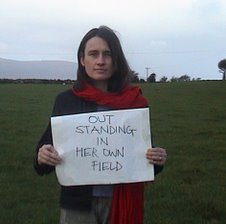February 15th 2006
This question was put to me today by Denis O' Sullivan on the Arts Programme of Tipp FM. My answer was something to the effect that a number of visual artists, including myself, are no longer comfortable with the idea of producing more and more images - the world is already full of them. I call myself a visual artist but increasingly I see myself as a cultural worker; definitions of culture are much broader and more interesting to me than definitions of art.
Extracts from THE IDEA OF CULTURE by Terry Eagleton published by Blackwell Publishing;
‘Culture’ is considered to be one of the two or three most complex words in the English language, and the term which is sometimes considered to be its opposite – nature – is commonly awarded the accolade of being the most interesting of all. . . .culture, etymologically speaking is a concept derived from nature. One of its original meanings is husbandry or the tending of natural growth. The word ‘coulter’ which is a cognate of culture, means the blade of a ploughshare. We derive our words for the finest of human activities from labour and agriculture, crops and cultivation. Francis Bacon writes of the ‘cultivation and manurance of minds’ ins a suggestive hesitancy between dung and mental distinction. ‘Culture’ here means an activity and it was a long time before the word came to denote an entity.
The Latin root of the word culture is colere, which can mean anything from cultivating and inhabiting to worshipping and protecting.
If culture means the active tending of natural growth then it suggests a dialectic between the artificial and the natural, what we do to the world and what the world does to us.
Nature produces culture which changes nature.
Read more of Terry Eagleton's book The Idea of Culture
"MuHKA presents a series of dialogues on the term culture as a keyword around which individuals and societies produce, contest and share meaning, bringing together several leading figures working in this field. In his book Keywords: A Vocabulary of Culture and Society, Raymond Williams gives a precise and useful account of the words that are instrumental in shaping our understanding of culture and society. Words, which although familiar, he believed, would benefit from further clarification; not in order to impose a finite meaning on them, but instead to describe their development, adaptation and translation between times and places and their relationship to other words. In his definition of ‘culture’ Williams describes this word as one of the two or three most complicated words and elsewhere as the original difficult word. It can simultaneously refer to: [1] intellectual, spiritual and aesthetic development [2] the way of life of a people, time or place and [3] artistic works or the output of aesthetic practices. According to Williams its complexity stems from the fact that the word culture plays an equally important role in a number of different areas of exper ience [art being one, society being another] between which it occupies an awkward place. By way of elucidation Williams traces the etymology of ‘culture’ back to its roots in plant or animal husbandry [to cultivate or to tend]; how it came to refer to the development of manners and the intellectual faculties, how it was extended to include more generalised social processes and how through its links to civilisation, class and civil values it acquired a contested status. The formulation and maintenance of cultural elites and the culture wars that saw previously excluded groups gate-crashing the citadel. Today the term ‘culture’ is deployed for a combination of progressive, bureaucratic and reactionary causes. As a remedy for social exclusion, for the empowerment of sub and counter cultural groups, as an instrument of government policy, and in the xenophobic ring-fencing of cultural values and norms on ethnic, religious and linguistic grounds. Williams believed that the awkward position that the word ‘culture’ occupies somewhere in-between social and artistic categories, rather than being a problem, instead produces a range and overlap of meaning that is the source of its significance. Indicating a complex argument about relations between general human development and a particular way of life, and between both and the works and practices of art and intelligence.This lecture series at MuHKA will take the slippage that finds ‘culture’ sitting in-between, artistic, social and theoretical discourse as its point of departure and consider the following questions: [1] Rather than divide culture into neat partitions such as art, politics and lifestyle can we approach it as a continuous field with many intersecting points? [2] How can we best challenge cultural norms which are exclusive and prescriptive and aim for a culture that is convivial and cosmopolitan? [3] Rather than accepting culture as commodity or policy objective, is it possible instead to imagine a culture that is always undisciplined, flexible and in motion?
lecture-series organised by Grant Watson [curator MuHKA]"
Journal of an Artist Residency / Miles to date 4,171/ Primary Carbon Footprint to date 1,139 kg = 1.139 tonnes
Thursday, February 15, 2007
Subscribe to:
Post Comments (Atom)


No comments:
Post a Comment